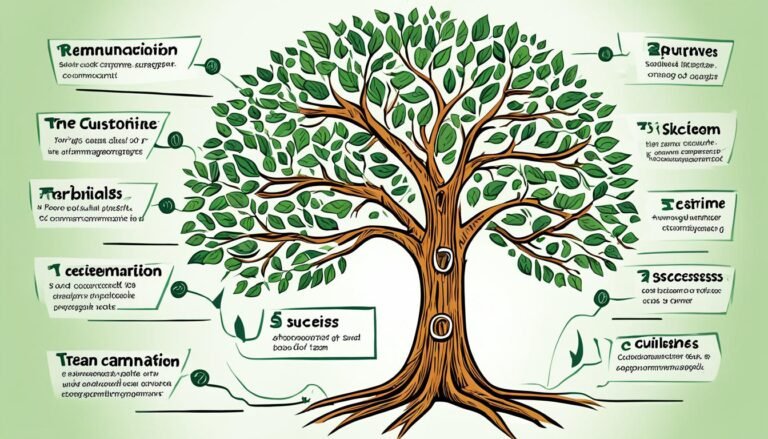Reflective as a Soft Skill
Embrace reflective thinking as a soft skill for personal growth. Analyze thoughts and actions, exploring inner motivations. Combine critical thinking with self-examination to enhance understanding. Challenge assumptions, improve problem-solving. Reflective practice leads to self-discovery, improved decision-making. Gain insights into strengths, values, beliefs. Boost self-awareness for confident navigation of challenges. Foster a growth-oriented perspective. Implement reflection in daily life through dedicated time, mindfulness practices. Journal for organized reflections. Ask reflective questions for insights. Structured routine integrates reflection into your day. Access the power of self-awareness and problem-solving skills through reflective thinking.
Key Takeaways
- Reflection enhances self-awareness and emotional intelligence.
- Critical analysis of thoughts and actions promotes problem-solving skills.
- Self-examination leads to personal growth and improved decision-making.
- Regular reflection fosters a growth-oriented perspective and positive mindset.
- Combining critical thinking with self-reflection nurtures a reflective mindset as a valuable soft skill.
Understanding Reflective Thinking
If you're looking to enhance your contemplative thinking skills, understanding the process is the first step towards growth and self-awareness. Critical thinking is at the heart of reflective practice. It involves analyzing and evaluating your own thoughts and actions to make informed decisions and improvements. Self-examination, on the other hand, explores your inner thoughts, emotions, and motivations. By combining critical thinking with self-examination, you can gain a deeper understanding of yourself and the world around you.
When engaging in reflective thinking, it's crucial to ask yourself probing questions. Challenge your assumptions, explore different perspectives, and consider the consequences of your actions. This process can be uncomfortable at times, but it's through this discomfort that true growth occurs. Embrace the opportunity to learn more about yourself and enhance your problem-solving skills.
Benefits of Reflective Practice
Exploring the benefits of reflective practice can lead to profound personal growth and enhanced decision-making skills. By engaging in reflective practices, you open yourself up to a world of self-discovery and improvement. One of the key advantages is the enhancement of your decision-making abilities. Through reflection, you can critically analyze past experiences, identifying what worked well and what could have been done differently. This process allows you to make more informed choices in the future, leading to better outcomes.
Moreover, reflective practice nurtures a deeper understanding of yourself and the circumstances surrounding your decisions. It helps you gain insights into your strengths, weaknesses, values, and beliefs. This heightened self-awareness empowers you to navigate challenges with more confidence and clarity. Embracing reflective practices can also foster a more positive mindset, as you learn to approach situations with a growth-oriented perspective.
In essence, the benefits of reflective practice extend far beyond just personal growth. They equip you with the tools needed for improved decision-making and critical analysis in various aspects of your life.
Developing Self-Awareness Through Reflection
Begin on a journey of self-discovery through reflective practice to nurture a deeper sense of self-awareness and understanding. By engaging in mindful introspection, you can start on a path of personal growth and enhance your emotional intelligence. Reflecting on your thoughts, actions, and experiences allows you to gain insights into your values, beliefs, and reactions, paving the way for profound self-discovery.
| Benefits of Reflective Practice | |
|---|---|
| 1. Self-discovery | 3. Improved decision-making |
| Explore your inner thoughts and feelings, leading to a better understanding of yourself. | Reflecting on past experiences helps you make more informed choices in the future. |
| 2. Personal growth | 4. Enhanced problem-solving skills |
| Through reflection, you can identify areas for improvement and work towards becoming the best version of yourself. | Analyzing past challenges enables you to develop effective strategies for overcoming obstacles. |
Embrace the power of reflection as a tool for self-awareness and personal development. Take time to reflect regularly, journal your thoughts, and observe how this practice positively impacts your life. Remember, self-awareness is the cornerstone of growth and success.
Enhancing Problem-Solving Skills
Begin on honing your problem-solving skills by reflecting on past challenges and identifying effective strategies for overcoming obstacles. Reflect on situations where you successfully navigated through difficulties and take note of the thought processes and actions that led to positive outcomes.
Here are three key ways to enhance your problem-solving skills:
- Engage in Critical Analysis: Dive deep into the root causes of the problem at hand. Ask yourself why the issue arose and consider all contributing factors. By critically analyzing the situation, you can gain a better understanding of the problem and identify potential solutions.
- Think Outside the Box: Embrace creativity when brainstorming solutions. Sometimes the most unconventional ideas can lead to breakthroughs. Allow yourself the freedom to explore different perspectives and consider innovative approaches to problem-solving.
- Seek Feedback and Collaboration: Don't hesitate to seek input from others. Collaborating with diverse individuals can bring fresh insights and ideas to the table. Constructive feedback can help refine your solutions and enhance the overall problem-solving process.
Implementing Reflection in Daily Life
To integrate reflection into your daily life effectively, consider setting aside a dedicated time each day to review your experiences and insights. Engaging in daily mindfulness practices such as mindful breathing can help center your thoughts and emotions, creating a conducive environment for reflection. Additionally, incorporating introspective journaling into your routine can provide a structured outlet for organizing your reflections and tracking your personal growth over time.
Below is a simple guide to help you implement reflection into your daily life:
| Daily Mindfulness | Reflective Practices |
|---|---|
| Practice mindful breathing exercises | Engage in introspective journaling |
| Set aside dedicated time for reflection | Ask yourself reflective questions |
| Stay present in the moment | Review your experiences and insights |
Conclusion
As you continue to practice reflection, remember that like a mirror, it shows you not just what's on the surface, but what lies within. Embrace the opportunity to explore deeper, uncovering layers of self-awareness and problem-solving skills.
Reflective thinking isn't just a skill, but a tool that can guide you through life's challenges. Keep looking into the mirror of reflection, and you'll find the clarity and insight you seek.
Keep reflecting, keep growing.








